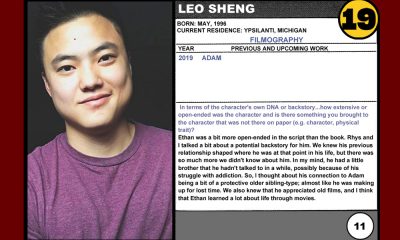Retro IONCINEMA.com
48th NYFF 2010: Olivier Assayas’ Carlos
Carlos is a very unique achievement both in today’s cinema and really compared to any of its predecessors. At once, it can most easily be compared to longer form feature films in the guise of television mini-series like Red Riding as well as contemporary genre and similar genre work from the 1970s. With Carlos, writer/director Olivier Assayas takes a gigantic leap in his career while also maintaining some of his consistent themes of globalization and even espionage in a way.
Carlos is a very unique achievement both in today’s cinema and really compared to any of its predecessors. At once, it can most easily be compared to longer form feature films in the guise of television mini-series like Red Riding as well as contemporary genre and similar genre work from the 1970s. With Carlos, writer/director Olivier Assayas takes a gigantic leap in his career while also maintaining some of his consistent themes of globalization and even espionage in a way.

The film breaks new ground in so many ways, and comparisons are few. It’s five and one-half hours, broken up over three distinct parts that easily make up their own standalone feature films. The languages are all kept accurately; there’s French, English, German, Spanish, Portuguese, Arab, Hungarian and more, with no particular given greater weight than what is realistically appropriate. Not only can this fall under the political thriller banner, but it’s also much more focused on demythologizing a generation.
At the center of all three films is their star, and all of these strengths are supported so strongly by lead actor Edgar Ramirez. Assayas explains that Ramirez was his top choice “in a list of one.” “Edgar was obvious. He was obvious in a sense that I did not know he existed when I was writing, and to me it came as some kind of miracle that such an actor as Edgar existed. Am I ever going to find an actor who’s fluent in three different languages—minimum—who has the same build as Carlos, who speaks Spanish with a Venezuelan accent, who is the right age…plus he happened to be a great actor.”
It was indeed serendipitous for the film and Assayas that Ramirez exists, as the likelihood of an actor with all of these parameters being found and also being a good actor is against all odds. Ramirez gets the chance to organically take on this role without needing to adjust himself or the character, and he takes it even further, really inhabiting the role to the point where the audience feels the story not only behind the real life Carlos but also Ramirez on his own.
Much of the arc of the entire trilogy can be marked by changes in Carlos’ body and virility. He starts out slim, bulks up, then gets fat, then slims down again when he goes back into action, then his body starts to betray him. The arc of his body is completely consistent to the arc of his career and thus confidence. Carlos’ entire journey seems to be about masculinity to begin with, so his downfall coming due to the loss of his sexual efficacy seems too fitting to be true.
A unique idea at work with this character is also his motivations. Most films like this give us characters driven by passion over reason. Passion for their cause, revenge, love, some external goal that is more important to them than anything else—even their life. Carlos is not driven by any of these things. It’s not even clear exactly what drives him, apart from that it changes. The character never coherently explains in the film what the cause of his organization is. He talks about being an enemy of capitalism and imperialism, hating the Americans, but really talks more about the notion of glory.
Interestingly enough, even though he is clearly mainly after the glory, it’s not the same glory as his compatriots. The OPEC operation that he leads, which is the largest of his “career” and encompasses the majority of the second film, fails because Carlos is afraid to die. The rest of his team sees it, and calls him out on it, but Carlos is running the show, and he makes a deal that saves all of their lives, but creates a huge embarrassment for them and their organization. He makes excuses based on bringing in money, but they all know what was really going through his head.
He’s not one of those freedom fighters who believes the most valiant way to die is for your cause. He wants to live forever. Carlos’ version of glory is that of a rock star or celebrity. Assayas connotes this with his choice of music in the film — you can read my in-depth analysis of the film’s music. He starts the film with a track by The Feelies, which sets the tone for this film as a punk rock odyssey. Assayas uses New Order’s “Dreams Never End” and Wire’s “Dot Dash” very effectively as well, both scenes creating segues and montages in ways that we do not normally see them—especially not in these kinds of films (Baader-Meinhof Complex uses action movie music when Carlos uses Peter Hook bassline intros).
Carlos is worth the five and a half hours. It’s an incomparable character piece, a rumination on masculinity and behavior in a 1970s generation that felt wronged by just about everyone, and empty without the passion of their 1960s predecessors. It’s a much higher art form than others that it will be compared to. The only real contemporary comparison is last year’s Red Riding Trilogy. Both are lush period pieces and have complicated, distinct and interesting plotlines that are actually often tossed aside in favor of focusing on character. Go see Carlos at IFC Center in the Roadshow version, don’t do the abridged one showing on Sundance Channel.



























